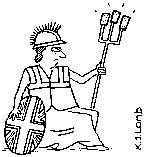I’m writing this near Ludlow, a town which has miraculously kept its centre.
I’m writing this near Ludlow, a town which has miraculously kept its centre. On Saturday last there was a bustling market, selling hundreds of things you might actually want to buy. Around it were the shops: independent butchers with pheasants hanging above the door, bakers you had to hurry past because you’d want to buy enough cakes to bring on a heart attack, independent clothiers selling long-forgotten styles, none made for 7p an hour by children in Bangladesh. It all looked marvellous.
Shepton Mallet in Somerset has not been so lucky, and that was the theme of Turn Back Time — The High Street on BBC1 (Tuesday), the latest reality show, a blend of Mary Queen of Shops and Masterchef, a point rammed home by having shouty Gregg Wallace as one of the presenters — goodness knows why, since he brings little except his trademark shoutiness.
The deal is that present-day shopkeepers — a butcher, a baker, a candlestick-maker (or ironmonger) plus a grocer — set up old-fashioned shops in disused properties. This week they were Victorians. I don’t know if it’s something in the water, but the people of Shepton Mallet seemed a little slow on the uptake. One woman arrived at the 1870s grocery demanding bottled mayonnaise and factor-30 sun block.
But they weren’t half as daft as Nigel, who runs a bakery at home, where his wife, a master baker, makes all the bread. Apparently, no women were professional bakers in Victorian times, so Nigel had to do it all himself, which he managed by following the usual male rule of ignoring everything his wife said. The result was bread that was burnt on the outside, damp in the middle, and so salty that one customer said she’d be afraid to feed it to the birds. Television loves a loser.
Nigel consulted experts about what Victorian bread contained; crooked bakers bulked it out with chalk and sawdust, an example he eagerly followed. He also added lard, and there was one moment when a little girl asked her mother, ‘What’s lard?’, and her mother asked, ‘Do you really want to know?’ She made it sound as nutritious as sump oil.
The show had its own grisly fascination (and thank heavens for the historian Juliet Gardiner, who actually knew what she was talking about, without shouting once) not least because we have forgotten how deracinated we are from our food. Mr Sergison, the grocer, explained that he didn’t sell crisps, ‘But I do have potatoes, and you can make your own.’ Yeah, right. Customers looked on in fascinated horror as the butcher cut up a gigantic Gloucester Old Spot pig, which, as it happened, was largely composed of lard.
In the end, the shops were all huge successes, which proves once again that people will go anywhere — or even eat lard — if it means they get to appear on television.
Gregg Wallace was surplus to requirements, as was his namesake in Wallace and Gromit’s World of Invention (BBC1, Wednesday), which was an otherwise fascinating canter round devices that depend on a study of the animal world, including a beautiful helium-filled manta ray which might one day be an airship, and a chap who has found a way of getting air out of the sea so that people can stay underwater for hours. In short, it was Tomorrow’s World with plasticine puppets introducing each item with feeble puns.
But it’s that terrible, tooth-furring nervousness of the BBC; the corporation gets the collywobbles whenever a programme is essentially serious. Unless they see someone they recognise, people will turn off. Or so they fear. In the past, good presenters were made stars by their skills — Anna Ford first became known on Tomorrow’s World — now they must be stars beforehand, and so are tacked on to programmes that don’t need them, and which they only clutter up, like both Wallaces.
And once again we had David Attenborough to thank for perhaps the finest series of the year so far, First Life (BBC2, Friday). There were no gambolling dolphins, no endangered tiger cubs, not a carnivorous termite to be seen. The first signs of life were dots in the water that turned out to be single-celled bacteria. We moved on to the next stage, primitive plants from eons when there was no distinction between fauna and flora. The grand climax was animatronic versions of the first organisms that could actually move; they looked like Jaffa cakes drifting across the ocean floor.
In the meantime, Attenborough, who is now 84, could be seen standing in the snow-bound wastes of Canada, or lying on a baked former seabed in the deserts of Australia. As always, his commentary was fluent, comprehensible and fascinating. There are some great layman’s books on paleontology, but only television can bring the topic bursting out of the screen.





Comments